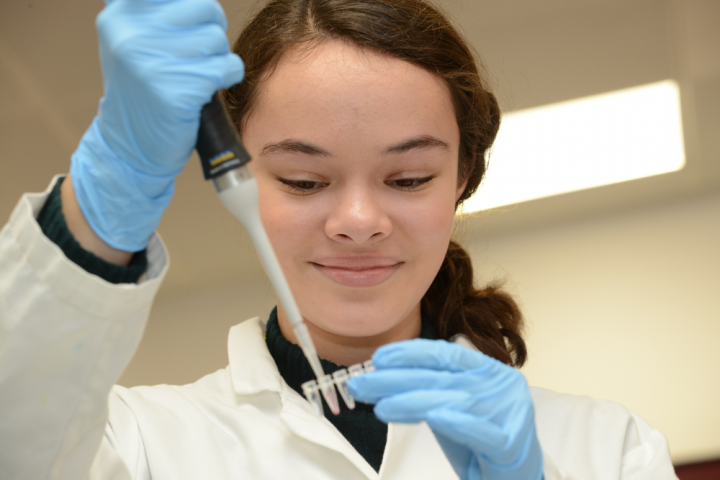Bee Lab: Diagnosing the Health of Your Honey Bees
Working with beekeepers and bee scientists, your pupils will analyse the health of the honeybees they have been caring for. In this full day, hands-on, citizen science workshop, your pupils will investigate if your bee colonies have Nosema using DNA and microscope analysis. This is a chance to for them to learn about the science behind bee health, contribute to real-research and meet and work with other bee enthusiasts.
Learning Level: NPA Beekeeping
Location: Easter Bush Science Outreach Centre, University of Edinburgh Easter Bush Campus, EH25 9RG
Minimum attendance: 16*
Maximum attendance: 24
Duration: 5 hours
Timings: 10am - 3pm
Cost: £5 per pupil**
Availability: Our secondary programme will be released Autumn 2023, to remain updated about our workshops, events and exciting opportunities please sign up to our mailing list and/or follow us on Twitter @EBSOClab. In the meantime, why not check out our classroom resources that are free to download!
* If your numbers are below 16, please let us know and we will do our best to twin you with another group.
** We are currently looking for external funding to support the running of this workshop and to help with transport costs. Please contact us if finance is a barrier to your school attending.
Workshop Description

Working with beekeepers and scientists from the Roslin Institute and the Scottish Government's Science & Advice for Scottish Agriculture (SASA) department,
your pupils will analyse the health of the honeybees they have been caring for at their school. In this full day, hands-on, citizen science workshop, your pupils will investigate if their bee colonies have Nosema using DNA analysis and microscopy. This is a chance to for them to learn about the science behind bee health, meet and work with other bee enthusiasts.
Please note that you will be asked to collect 60 bees from hives from your local area on a specific day and send them to The Roslin Institute (instructions will be given), approximately 4 weeks before your visit so that we can prepare the DNA samples.
The day at EBSOC was so special because it allowed us as bee enthusiasts to see what was killing off bee colonies accross Scotland. We worked with some of the countries leading researchers and they helped us understand the science behind beekeeping. We used microscopy and DNA analysis to investigate our very own bee colonies, I can see how this could have a huge impact in future bee health across the globe.
Learning Objectives
- To understand all living things have DNA and that DNA is unique
- To realise that there are different methods for looking for parasites including visual inspection of hives, microscopy and DNA analysis
- To appreciate that beekeeping has lots of science involved and can help scientific research
- To confidently use the scientific method
- To interpret and discuss experimental results
Techniques used
- Micropipetting
- DNA gel electrophoresis
- Microscopy (preparing slides and using microscopes)
Workshop timeline
- Review of honeybee parasites and how bee scientists can look for disease
- Introduction to micropipettes
- Preparation of DNA samples for gel electrophoresis
- Introduction to DNA electrophoresis
- Microscope analysis of bees, looking for Nosema
- Visit to our local apiary for a visual inspection of a hive for other parasites*
- DNA electrophoresis using agarose gels
- Analysis and interpretation of results
- Discussion with beekeepers and bee scientists
* visit to our apairy is only possible if you bring your own freshly washed beekeeping suits
It was an inspiring day and it was amazing to see students, of whom many don't study science at school, engage with it in a meaningful way. Alfie said said learning about DNA in the lab was fun and Heather said it was an amazing experience. Ellie said it helped her understand the disease Nosema and that we would now have to look at and how to deal with it. Caoimhe was very pleased she was able to do and learn tasks she's never done before. One parent messaged me to say thanks and that her daughter had said she had the best day ever.
Curriculum Links
|
Outcome 3 Describe how to subdue and handle bees. Performance criteria (a) Describe the reasons for making a hive inspection. (b) Describe the environmental conditions conducive to successful manipulations of bees. |
Outcome 4 Describe the principal pests and diseases affecting bees in the UK. Performance criteria (a) Describe the pests and diseases to which the brood and adult bee are susceptible, and identify which are notifiable. (b) Describe the symptoms and effects of the principle bee diseases. (c) Describe likely treatment and control for the principle bee diseases. |
Developing the Young Workforce – “I can” statements
The following "I can" statements are supported through EBSOC’s workshops:
-
I can demonstrate and apply the skills I have learnt across the curriculum in relation to the world of work.
-
I can demonstrate diverse thinking when exploring learning opportunities and pathways.
-
I can investigate and assess ethical issues in business and trade decisions.
Availability
Thank you for your interest in this workshop, this academic year we will not be offering this workshop as part of our learning programme. Why not check out classroom resources that are free to download!
Important Notes
* Please contact us ebsoc@ed.ac.uk if your group falls below the minimum as we may be able to accommodate your request
by combining pupils from another school.
Downloadable Recources
Risk Assessment |
|
| To be added | |
Workshop Description |
|
Related Links
Royal Society Schools Partnership Beelab at EBSOC

